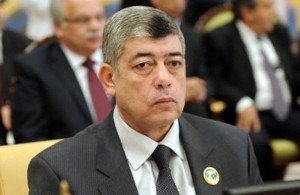Special to WorldTribune.com
CAIRO ― The Muslim Brotherhood is said to have confessed to operational links with Al Qaida.
The son of a Brotherhood leader is said to have told Egyptian authorities that the ousted ruling movement was working with Al Qaida to destabilize Egypt.

The detainee, Yehya Mongi, son of a Brotherhood member of parliament, said he joined the Al Qaida-linked Ansar Beit Al Maqdis.
“His job was to conduct surveillance,” Egyptian Interior Minister Mohammed Ibrahim said.
The purported confession of Mongi marked the first reported evidence of Egypt’s allegations of Brotherhood cooperation with Al Qaida.
Officials said Mongi was one of scores of Brotherhood operatives who joined Ansar as well as another Al Qaida militia, Furqan Brigades. Furqan was said to be led by Mohammed Ahmed Nasser.
In a news conference on Jan. 2, Ibrahim said Mongi was one of a seven-member Ansar cell that bombed the security headquarters in Mansoura on Dec. 24. The interior minister said Mongi hosted Ansar’s commander, identified as Tawfiq Freig, also known as Abu Abdullah.
The interior minister said the Brotherhood formed links with Al Qaida
and other insurgency movements during the one-year rule of President
Mohammed Morsi, ousted by the military in July 2013. Ibrahim said Morsi
allowed insurgency militias, including Hamas and Hizbullah, to operate
throughout the Sinai Peninsula. Morsi faces trial on Jan. 28.
“The Brotherhood allied with extremist groups during Morsi’s
one-year-rule,” Ibrahim said. “It communicated with its extremist allies in
order to execute its aggressive plans.”
Ibrahim said the Brotherhood has established an operational headquarters
in the Hamas-ruled Gaza Strip. The minister, who read the names of
operatives, said the Brotherhood was receiving military training from Hamas
and recruiting fighters for the revolt in Sinai. Ibrahim identified the
leading Hamas liaisons as Ayman Nofal and Raed Attar, commanders of Hamas’
military wing, Izzedin Kassam.
“They provided them with various aspects of logistic support through
hosting them [Brotherood members] in the Gaza Strip and teaching them the
rules of security and training them on various weapons at the Kassam
Brigades camps,” Ibrahim said.
Hamas was also said to have provided the Brotherhood with devices to jam
the detection systems of Egyptian Air Force aircraft. The Gaza regime was
also accused of helping the bombing in Mansoura, in which 16 people were
killed and more than 130 injured. One of the Brotherhood liaisons with Hamas
was identified as Amr Mosad, who infiltrated the Gaza Strip and underwent
military training.
“The two parties [Brotherhood and Hamas] discussed some issues related
to military technology, including the invention of two devices aiming to
disturb the work of aircraft, adjusting the process of directing the Kassam
rockets, developing the work of decoders, and developing a system for
monitoring aircraft with the use of computers,” Ibrahim said.
Palestinians have been accused of playing a major role in the
Brotherhood campaign to destabilize Egypt. Ahead of the Jan. 28 trial, more
than 70 of the 130 defendants have been identified as Palestinians, most of them
alleged members of Hamas. Hamas and its militia allies were also accused of
recruiting 800 Palestinians to infiltrate Egypt and attack police stations
and prisons in 2011. Hamas has denied the accusations.
“The accusations of involvement in the Mansoura bombing are an attempt
to export the internal Egyptian crisis,” Hamas spokesperson Sami Abu Zuhri
said.

You must be logged in to post a comment Login